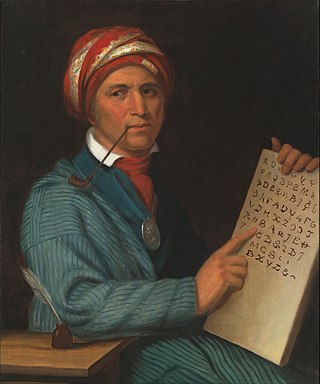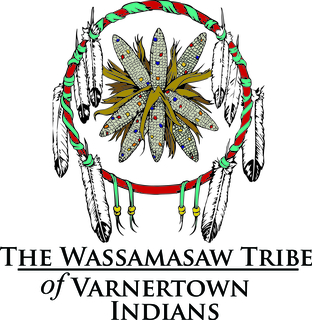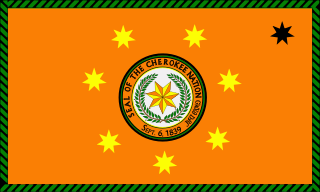
The Cherokee people are one of the Indigenous peoples of the Southeastern Woodlands of the United States. Prior to the 18th century, they were concentrated in their homelands, in towns along river valleys of what is now southwestern North Carolina, southeastern Tennessee, southwestern Virginia, edges of western South Carolina, northern Georgia and northeastern Alabama consisting of around 40,000 square miles.

The term Five Civilized Tribes was applied by the United States government in the early federal period of the history of the United States to the five major Native American nations in the Southeast: the Cherokee, Chickasaw, Choctaw, Muscogee (Creek), and Seminoles. White Americans classified them as "civilized" because they had adopted attributes of the Anglo-American culture.

The Qualla Boundary or The Qualla is territory held as a land trust by the United States government for the federally recognized Eastern Band of Cherokee Indians (EBCI), who reside in Western North Carolina. The area is part of the large historic Cherokee territory in the Southeast, which extended into eastern Tennessee, western South Carolina, northern Georgia, and Alabama. Currently, the largest contiguous portion of the Qualla lies in Haywood, Swain, and Jackson counties and is centered on the community of Cherokee, which serves as the tribal capital of the EBCI. Smaller, non-contiguous parcels also lie in Graham and Cherokee counties, near the communities of Snowbird and Murphy, respectively.
The Lumbee are a Native American community primarily centered in Robeson, Hoke, Cumberland, and Scotland counties in North Carolina. The Lumbee Tribe of North Carolina is a state-recognized tribe in North Carolina numbering approximately 55,000 enrolled members.
The Eastern Band of Cherokee Indians (EBCI), is a federally recognized Indian tribe based in western North Carolina in the United States. They are descended from the small group of 800–1,000 Cherokees who remained in the Eastern United States after the U.S. military, under the Indian Removal Act, moved the other 15,000 Cherokees to west of the Mississippi River in the late 1830s, to Indian Territory. Those Cherokees remaining in the east were to give up tribal Cherokee citizenship and to assimilate. They became U.S. citizens.

The Yuchi people are a Native American tribe based in Oklahoma, though their original homeland was in the southeastern United States.

The United Keetoowah Band of Cherokee Indians in Oklahoma is a federally recognized tribe of Cherokee Native Americans headquartered in Tahlequah, Oklahoma. According to the UKB website, its members are mostly descendants of "Old Settlers" or "Western Cherokees," those Cherokees who migrated from the Southeast to present-day Arkansas and Oklahoma around 1817. Some reports estimate that Old Settlers began migrating west by 1800, before the forced relocation of Cherokees by the United States in the late 1830s under the Indian Removal Act.
State-recognized tribes in the United States are organizations that identify as Native American tribes or heritage groups that do not meet the criteria for federally recognized Indian tribes but have been recognized by a process established under assorted state government laws for varying purposes or by governor's executive orders. State recognition does not dictate whether or not they are recognized as Native American tribes by continually existing tribal nations.

The Coushatta are a Muskogean-speaking Native American people now living primarily in the U.S. states of Louisiana, Oklahoma, and Texas.

Ysleta del Sur Pueblo, also Tigua Pueblo, is a Native American Pueblo and federally recognized tribe in the Ysleta section of El Paso, Texas. Its members are Southern Tiwa people who had been displaced from Spanish New Mexico from 1680 to 1681 during the Pueblo Revolt against the Spaniards.

The Wassamasaw Tribe of Varnertown Indians or Wassamasaw Tribe is a state-recognized tribe and 501(c)(3) nonprofit organization headquartered in Berkeley County, South Carolina. The organization was awarded the status of a state-recognized tribe by the South Carolina Commission of Minority Affairs in November 2009, becoming the sixth state-recognized tribe within South Carolina. They are not federally recognized as a Native American tribe by the Bureau of Indian Affairs. The Catawba Indian Nation is the only tribe in South Carolina that is federally recognized by the U.S. Government.

The Cherokee Nation, formerly known as the Cherokee Nation of Oklahoma, is the largest of three federally recognized tribes of Cherokees in the United States. It includes people descended from members of the Old Cherokee Nation who relocated, due to increasing pressure, from the Southeast to Indian Territory and Cherokees who were forced to relocate on the Trail of Tears. The tribe also includes descendants of Cherokee Freedmen and Natchez Nation. As of 2024, over 466,000 people were enrolled in the Cherokee Nation.
The Beaver Creek Indian Tribe or Beaver Creek Indians is a state-recognized tribe and nonprofit organization headquartered in Salley, South Carolina. The organization was awarded the status of a state-recognized tribe by the South Carolina Commission of Minority Affairs on January 27, 2006. They are not a federally recognized Native American tribe and are one several recognized nonprofit organizations within South Carolina that allege to be descended from the historic Pee Dee. The organization is not to be confused with the Pee Dee Indian Nation of Beaver Creek, a "state-recognized group" recognized by the South Carolina Commission of Minority Affairs in 2007.
Cherokee heritage groups are associations, societies and other organizations located primarily in the United States. Such groups consist of persons who do not qualify for enrollment in any of the three federally recognized Cherokee tribes. As the Cherokee Nation enrolls all people who can prove descent from a Cherokee ancestor, many of these groups consist of those who claim Cherokee ancestry but have no documentation to prove this alleged heritage. Some have had their claims of ancestry checked and proven to be false. A total of 819,105 Americans claimed Cherokee heritage in the 2010 Census, more than any other named tribe in the Census.

The Muscogee Nation, or Muscogee (Creek) Nation, is a federally recognized Native American tribe based in the U.S. state of Oklahoma. The nation descends from the historic Muscogee Confederacy, a large group of indigenous peoples of the Southeastern Woodlands. They commonly refer to themselves as Este Mvskokvlke. Historically, they were often referred to by European Americans as one of the Five Civilized Tribes of the American Southeast.
The Poarch Band of Creek Indians are a federally recognized tribe of Native Americans with reservation lands in lower Alabama. As Mvskoke people, they speak the Muscogee language. They were formerly known as the Creek Nation East of the Mississippi. The Poarch Band of Creek Indians are a sovereign nation of Muscogee (Creek) people with deep ancestral connections to lands of the Southeast United States.

The Lumbee Tribe of North Carolina is a state-recognized tribe in North Carolina. The tribe represents Lumbee people. They do not hold federal recognition as a Native American tribe. All three Cherokee tribes — the Eastern Band, the Cherokee Nation, and the United Keetoowah Band of Cherokee Indians — have denied that the Lumbee are their own tribe, instead insisting they are Cherokee, and are vocal opponents of granting the Lumbee federal recognition.

The Echota Cherokee Tribe of Alabama is a state-recognized tribe in Alabama and Cherokee heritage group. It is based in northern Alabama and gained state-recognition under the Davis-Strong Act in 1984.
Indian arts and crafts laws are federal, state, and tribal truth-in-advertising laws in the United States that prohibit misrepresentation in marketing of American Indian or Alaska Native arts and crafts products. The federal Indian Arts and Crafts Act of 1990 (IACA) defines an American Indian as a member of a federally or state-recognized tribe, while state and tribal Indian arts and crafts laws typically restrict the definition of an American Indian to citizens of federally recognized tribes only. At least 13 states and 4 federally recognized American Indian tribes have passed Indian arts and crafts laws.











